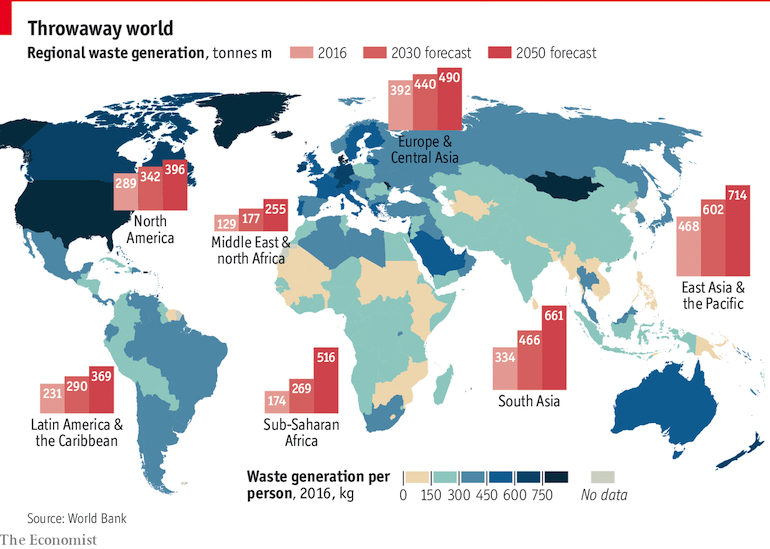You don’t have to be a Zero Waste superhero to live a low impact life
Are you concerned about the collapse of our eco-systems? Do you try to find ways to recycle, reuse, and generally reduce your negative impact on the environment? You are not alone. Unfortunately, this is not an easy thing to do, that is where the Zero Waste movement comes into play, an increasingly popular lifestyle that aims to produce as little rubbish as possible.
Producing absolutely no waste sounds like a tall order that can only appeal to Zero Waste superheroes. More generally, the movement focuses on reducing waste production as much as possible. The goal of Zero Waste is to move to a circular economy. Everything can be transformed and re-enter the system.
By mid-century Europeans and North Americans will produce a quarter more waste than they do today. Volumes will grow by half in East Asia, they will double in South Asia and triple in sub-Saharan Africa. This waste is primarily composed of organic material like food, green waste and paper, but also includes industrial and construction waste, glass, metal, paper and plastics. Much of our trash goes to landfills. The annual global total prediction of waste production for 2050 will approach 3.4bn tonnes.


What about you?
You avoid fast fashion, you compost, you rarely buy new things, you carry a cloth bag everywhere, you choose plastic-free products, you get your coffee in your own cup.
You still produce waste.
Waste from not being able to compost at work, from forgetting an essential ingredient in your cake or from too many leftovers.
Even if you try to your best to send a minimum to a landfill, to reduce what you need, to reuse what you can, to send little to be recycled, and to compost the rest…
You still end up with plastic.
Plastic from the packaging of your last order of eco-products, plastic from the day when you didn’t have your reusable bottle and ended up with a plastic one, plastic from items that have no green alternatives.

What about you?
You avoid fast fashion, you compost, you rarely buy new things, you carry a cloth bag everywhere, you choose plastic-free products, you get your coffee in your own cup.
You still produce waste.
Waste from not being able to compost at work, from not eating that soup quick enough, from forgetting an essential ingredient in your cake or from too much leftovers.
Even if you try to your best to send a minimum to a landfill, to reduce what you need, to reuse what you can, to send little to be recycled, and to compost the rest…
You still end up with plastic.
Plastic from the packaging of your last order of eco-products, plastic from the day when you didn’t have your reusable bottle and ended up with a plastic one, plastic from items that have no green alternatives.
What should I do then?
We live at a fast pace and it doesn’t help. We do not always make the best choices. Because the best choices need time. Because the best choices need energy and commitment. More often, the fast and easy options we choose create some amount of waste. So it can be very difficult for most people to adhere to a movement with such an unattainable aim. By putting so much pressure on yourself, you counteract part of the reason you were doing this in the first place : to save the planet.
Like a restrictive diet, trying to live Zero Waste can take over your life and leave you feeling guilty every time you “mess up.”
Spoiler alert : It does not work.
Not if you take it literally. Zero Waste indeed sets you up for failure. Here’s why.
You don’t have a small transparent glass jar containing your yearly waste to show the world. What you have looks more like a bunch of 20L buckets stuffed with plastic.
And your jar, well… is not very instagrammable.
The problem with recycling
There is an issue with promoting recycling and especially plastic recycling as being eco-friendly. All plastics are down-cycled. The end-result is waste nonetheless. The Zero Waste movement makes no attempts at closing the recycling loop. Instead of throwing our waste into the one big trash can, we have several small ones to recycle it. Bulk stores also have to deal with plastic in the packaging of their products, so the problem is still there, passed up the chain.
- While it is certainly better to recycle plastic than to just throw it “away”, our dependency on plastic needs to be addressed.
The problem with guilt
Being Zero Waste can be very guilt-inducing every time we crave a packaged snack or we forget our reusable water bottle. It can stop us from buying ethical products that come with packaging. We need not to shake off the guilt but to accept it instead and aim for progress not perfection.
- If guilt and restriction are the priority rather than doing good, there is little hope of having a clear understanding the bigger picture.
The problem with priorities
At your local bulk store you can buy plastic-free but you can also question the source of their products. Are they coming from sustainable sources or from countries without basic regulations? Most of the environmental impact of meat is in growing the stock food (usually requiring fertilizers and water) and on the farm (cows’ emissions, water/soil pollution). Switching from an un-packaged beef burger to a packaged plant-based burger still reduces the overall impact of your meal.
This also applies to clothing as most of the environmental and social impacts lie in the manufacturing and in the care of these clothes (washing/drying/ironing). Being Zero Waste can conflict with eating vegan (for example the plant-based milks in non-recyclable packaging) or eating organic (organic products are often wrapped in plastic to avoid contamination in supermarkets).
Focusing on Zero Waste means prioritizing waste. There are other sustainability issues you can perceive as more important. Many products and brands have a sustainable and ethical focus throughout their supply chain, production and use. Things like ethical manufacturing, slow-impact production, sustainable materials, quality/longevity. You may also want to support small, conscious or local businesses. Limiting carbon emissions might seem more urgent than ditching the plastics.
- There are other sustainable issues that can trump the issue of waste, it all depends on your priorities.
The problem with perfection
Zero Waste reminds me of the populist Zero tolerance political concept often brought up by populists when it comes to drugs, crime or whatever plagues our modern societies. It brings the idea that a simple solution can be applied to very complex problems. Although marketable it sets a goal which is simply not achievable. The title Zero Waste assumes so many things that it just leaves us open to failure, inconsistencies and hypocrisies. It can create a lot of guilt and also turn people off from the movement.
- If you focus on perfection you will drive yourself and others crazy.
The problem with location
The only way to buy fruits and vegetables without producing waste is if you grow them yourself or buy them from local farmers. And even then, we have to consider some transport and packaging in the latter. Anyway, growing your own organic food and selling your surplus of organic vegetables, fruits and berries is relegated to dreamland for most of us. If you live anywhere which is neither a rural place nor a place with easy access to bulk stores, it can be quite a challenge to be Zero Waste.
- There are places where Zero Waste is simply not a realistic lifestyle.

The Zero Waste movement has real potential to draw people into the conversation. It has already opened the eyes of many who are now being much more selective about what they buy.
So maybe it might simply need a slight change of name? Doing so could suddenly open the door to an influx of new fans. Many of us are ready to do our best to change and improve the way we consume, the way we approach waste, the way we think about our footprint on this planet. But living Zero Waste is simply not possible.
Some people have already adopted the title Low Impact or Low Waste instead. Trying to live a Low Impact life it is a far better alternative because it leaves space for failures and mistakes.
It gives us hope that ordinary people can also answer the call to save the world.
Not just superheroes.
